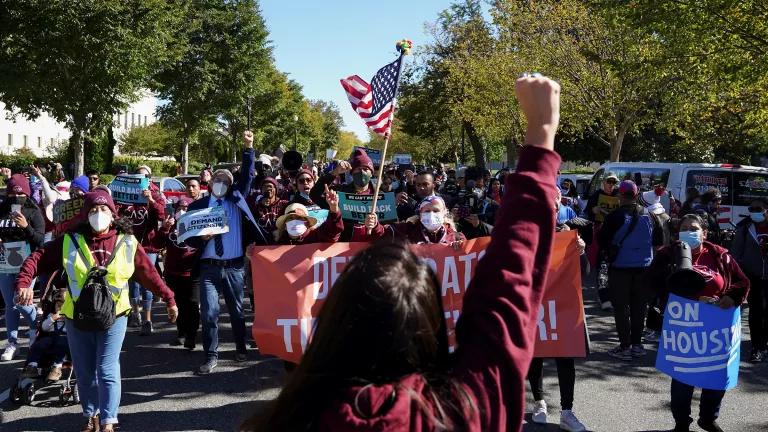Seattle Mayor Jenny Durkan to Help Transition Homes off Oil
Seattle Mayor Jenny Durkan, with a unanimous City Council, passed a law to help homes with oil-fueled heating sources transition to clean, electric heat.

Not that many people heat their homes with oil, but for those who do, heating oil can be a costly and unhealthy burden. In Seattle, roughly 10 percent of Seattle’s single-family households find themselves with oil-heating infrastructure— but that’s about to change.
Building on the momentum from the Youth Climate Strikes, on Monday, Seattle Mayor Jenny Durkan, together with a unanimous City Council, passed a law to help homes with oil-fueled heating sources transition to clean, electric heat.
The move represents a huge step in the Mayor’s plan to combat climate change through the city’s 2018 Climate Strategy and, if fully adopted, would lead to the climate equivalent of taking 90,000 passenger cars off the road a year and result in a whopping 16-18 percent reduction in carbon emissions from residential buildings.
Seattle is one of 25 winning cities in the American Cities Climate Challenge, a Bloomberg initiative led by Delivery Associates and the Natural Resources Defense Council to accelerate cities’ efforts to tackle climate change and promote a sustainable future for residents. The Climate Challenge is excited to be working with climate champions such as Mayor Durkan, and we hope Seattle’s leadership on this issue sparks action in cities across the country.
What does Seattle’s Policy Do?
Seattle’s policy provides incentives for homeowners to replace oil heating systems with clean and efficient electric heat pumps, paid for through a $0.24/gallon tax on oil for Seattle heating oil providers. It also helps pay for the full cost of conversion for approximately 1,000 homes with low-incomes to an efficient and clean heat pump, and provides a pathway for additional benefits offered by the City of Seattle, including a 60 percent electric rate subsidy and weatherization such as insulation and air-sealing.
Here’s the timeline: the tax will go into effect in September of 2020. Then, by 2028, heating oil tank owners will be required to either decommission or upgrade their existing underground oil tank to a leak resistant tank. That’s because most homes with oil have tanks that are well beyond their useful life. These older tanks are more likely to deteriorate and leak (as many as 1 in 4 according to state data), causing a myriad of issues including damaged soil, property, even groundwater.
Making It Fair
Upfront costs of new heating equipment can often be prohibitive, especially for families on lower incomes. Seattle’s policy prioritizes full-cost coverage for low-income families to make the conversion. These homeowners can expect to save $850 a year in reduced operating costs. Typical oil heaters cost about $1,700 per year, and converting to electric heating pumps is more than twice as efficient as a furnace.
Thanks to a nonprofit that offers home energy loans, residents are also able to finance the conversion through a loan that can be paid directly on their electric bill. With financing, the annual cost of heat pumps may often be the same cost or cheaper than oil in year one.
The policy also includes consideration for the impacts on the oil heating industry, dedicating a portion of the tax revenue for workforce training and business planning support for affected heating oil service providers.
There is work still to be done. Seventy-five percent of Seattle’s greenhouse gas emissions come from natural gas. In September, Seattle’s City Council proposed a ban on natural gas hookups, taking a page from Berkeley’s playbook. The legislation is still in the works.
For the Rest of the Country
Nationwide, 12 percent of households use oil or propane as their primary heating source: 5.7 percent on oil and 6.6 percent on propane, with higher concentrations of oil heating in New England (40 percent) the Mid-Atlantic Region (20 percent), and rural regions across the country, according to analysis from ACEEE. Across the country, clean heating technologies in homes and businesses could cut carbon pollution by 10 percent, according to the Rocky Mountain Institute.
Seattle’s policy is among the most innovative local government heating transition policies in the nation, with its tax and incentive approach, prioritization for low-income households and consideration of impacts on fossil fuel workers.
It also follows a wave of recent activity to accelerate the decarbonization of buildings—to make them fuel and emissions-free.
Maine, the most heating-oil-dependent state in the country, adopted an audacious goal in June of this year: installing 100,000 new high-performance heat pumps by 2025. This will be achieved through additional Efficiency Maine Trust (EMT) incentives, funded through Forward Capacity Market revenues, and coordinated programming with Maine State Housing Authority, funded by a portion of the Low-Income Home Energy Assistance Program (LIHEAP). Notably, additional resources and higher rebates would go to low- and middle-income Mainers.
The news in Maine was preceded by an announcement from California in December approving full-cost conversion from propane to clean, heat-pump systems for 1600 lower-income households in the San Joaquin Valley.
--
Seattle’s policy sets a high bar for cities across the country to meet and exceed.



